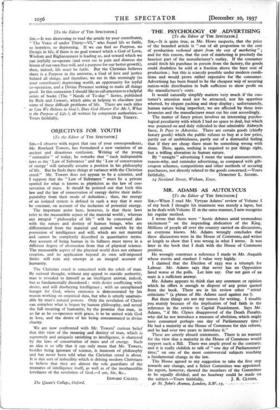OBJECTIVES FOR YOUTH
[To the Editor of THE SPECTATOR.] SIR,—I observe with regret that one of your correspondents, Mr. Rowland Towers, has formulated a new variation of an ancient and disastrous confusion. Writing of the young " rationalist " of today, he remarks that "such indisputable laws as the 'Law of Substance' and the 'Law of conservation of energy' will naturally assume a position in his philosophy of life. But he finds these things at variance with the Christian creed." Mr. Towers does not appear to be a scientist, and I suppose that the "Law of Substance" must he a private symbol for what is known to physicists as the law of con- servation of mass. It should be pointed out that both this law and the law of conservation of energy derive their indis- putability from their mode of definition ; thus, the energy of an isolated system is defined in such a way that it must be constant, on account of the inclusion of potential energy.
The important point here, however, is that these laws refer to the measurable aspect of the material world ; whereas any integral "philosophy of life" will be concerned also with the nature and destiny of human beings, who are differentiated from the material and animal worlds by the possession of intelligence and will, which are not material and cannot be completely described in quantitative terms. Any account of being human in its fullness must move in a different degree of abstraction from that of physical science. The measurable aspect of the physical world does not exhaust creation, and its application beyond its own self-imposed limits will ruin any attempt at an integral account of humanity.
The Christian creed is concerned with the whole of man. By rational thought, without any appeal to outside authority, man is revealed to himself as an intelligent animal, indeed, but as fundamentally disordered : with desire conflicting with desire, and will disobeying intelligence ; with an unexplained hunger for God, whose existence is demonstrated by his reason working on empirical data, but who is utterly unattain- able by man's natural powers. Only the revelation of Christ can complete what is begun by human philosophy, and reveal the full meaning of humanity, by the promise that man, in so far as he co-operates with grace, is to be united with God in love, and the desire of his being consummated in divine charity.
We are now confronted with Mr. Towers' curious belief that this view of the meaning and destiny of man, which is supremely and uniquely satisfying to intelligence, is shattered by the laws of conservation of mass and of energy. Such an idea is so silly that it can only mean that Mr. Towers, besides being ignorant of science, is innocent of philosophy and has never been told what the Christian creed is about. It is this sort of imbecility which is driving modern Christians to believe that they are almost the sole guardians of the treasures of intelligence itself, as well as of the inexhaustible loveliness of the revelation of God.—! am, Sir, &c., The Queen's College, Oxford. EDWARD CALDIN.






















































 Previous page
Previous page